Benefits of On-going Professional Development in Hospitality Management
VerifiedAdded on 2023/04/17
|17
|3131
|278
AI Summary
This document discusses the benefits of on-going professional development for different stakeholders within a specific organisation in the field of Hospitality Management. It also explores the expectations of employers in terms of skills and competencies, and provides insights into personal abilities, skills, and competencies required for a specific job role. Additionally, it covers various learning theories and approaches used for personal and professional development processes.
Contribute Materials
Your contribution can guide someone’s learning journey. Share your
documents today.
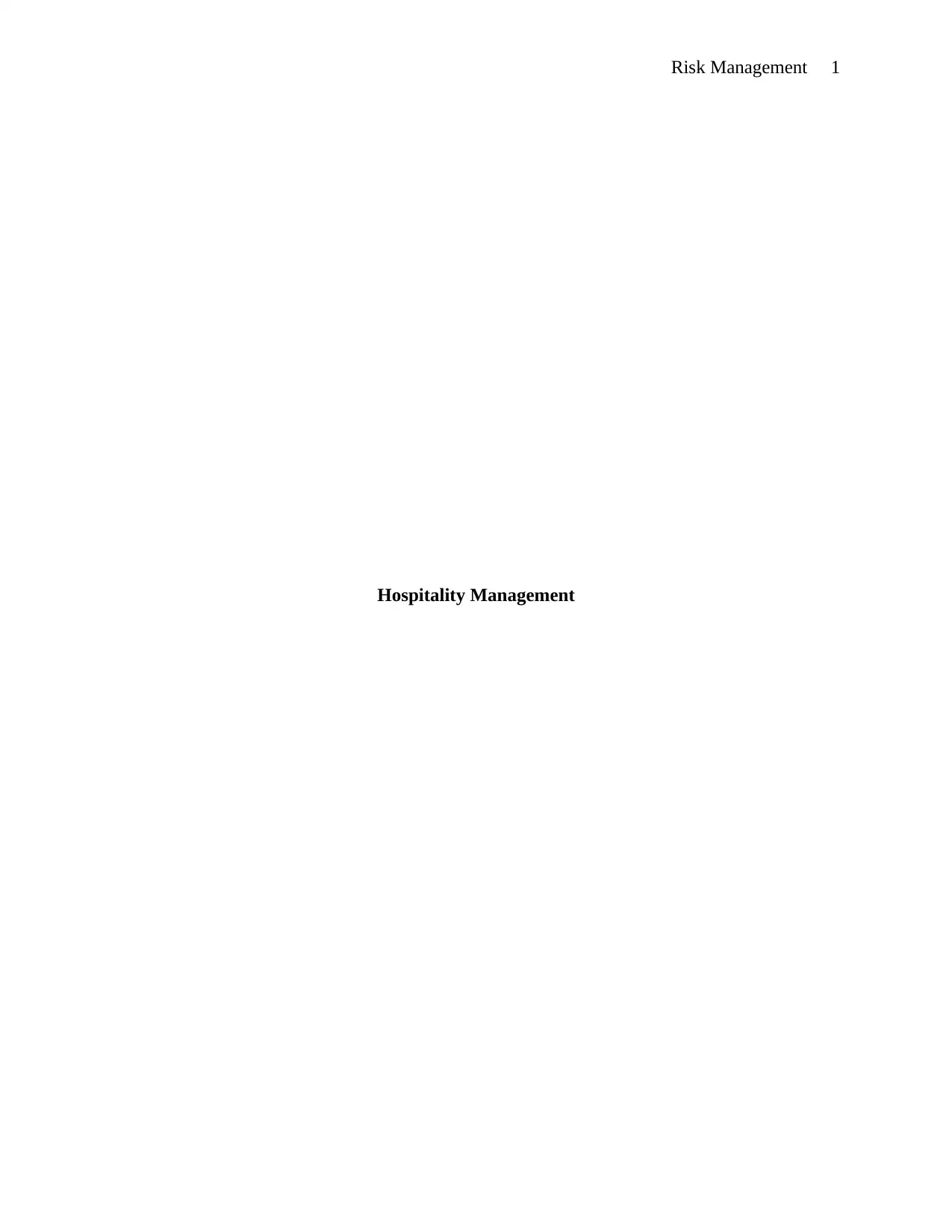
Risk Management 1
Hospitality Management
Hospitality Management
Secure Best Marks with AI Grader
Need help grading? Try our AI Grader for instant feedback on your assignments.
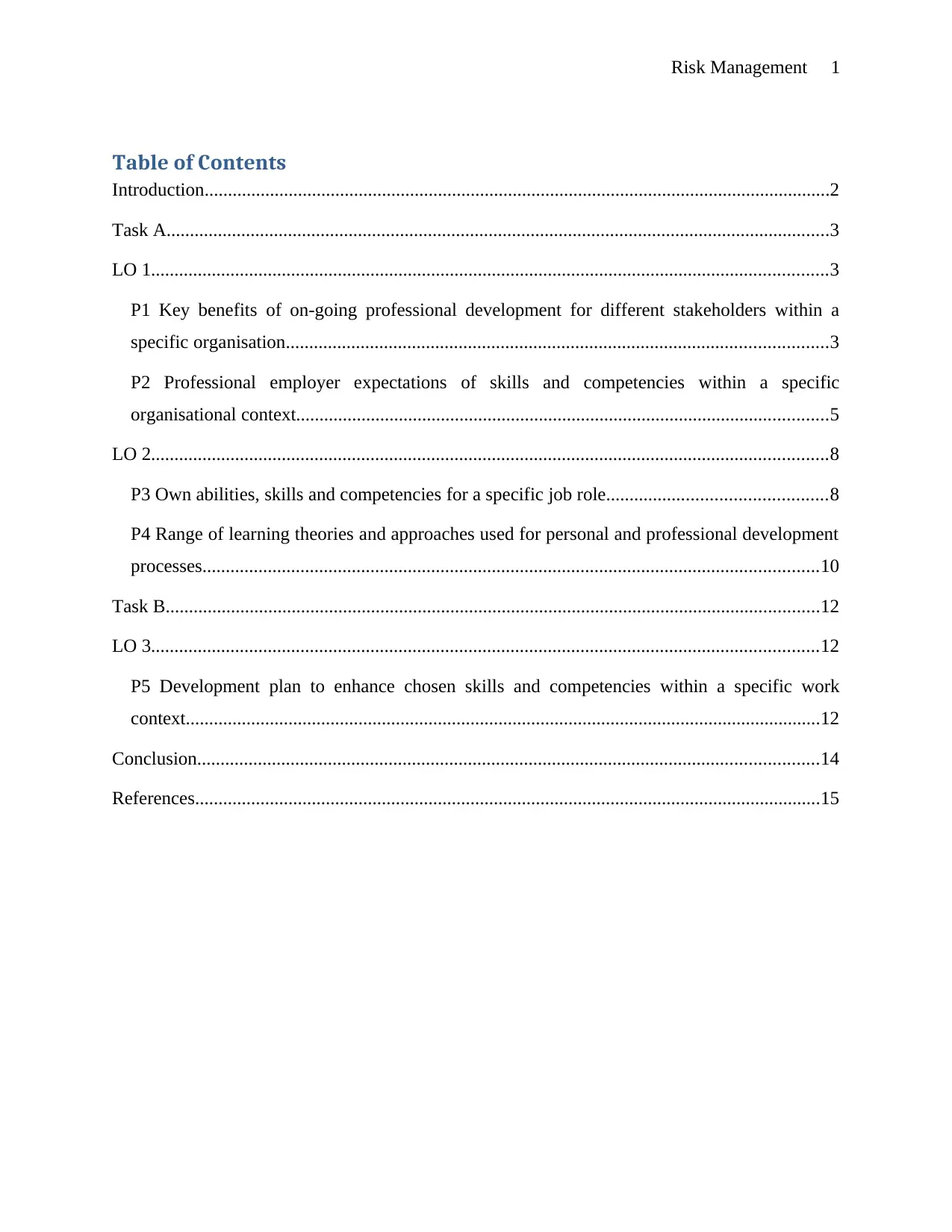
Risk Management 1
Table of Contents
Introduction......................................................................................................................................2
Task A..............................................................................................................................................3
LO 1.................................................................................................................................................3
P1 Key benefits of on-going professional development for different stakeholders within a
specific organisation....................................................................................................................3
P2 Professional employer expectations of skills and competencies within a specific
organisational context..................................................................................................................5
LO 2.................................................................................................................................................8
P3 Own abilities, skills and competencies for a specific job role...............................................8
P4 Range of learning theories and approaches used for personal and professional development
processes....................................................................................................................................10
Task B............................................................................................................................................12
LO 3...............................................................................................................................................12
P5 Development plan to enhance chosen skills and competencies within a specific work
context........................................................................................................................................12
Conclusion.....................................................................................................................................14
References......................................................................................................................................15
Table of Contents
Introduction......................................................................................................................................2
Task A..............................................................................................................................................3
LO 1.................................................................................................................................................3
P1 Key benefits of on-going professional development for different stakeholders within a
specific organisation....................................................................................................................3
P2 Professional employer expectations of skills and competencies within a specific
organisational context..................................................................................................................5
LO 2.................................................................................................................................................8
P3 Own abilities, skills and competencies for a specific job role...............................................8
P4 Range of learning theories and approaches used for personal and professional development
processes....................................................................................................................................10
Task B............................................................................................................................................12
LO 3...............................................................................................................................................12
P5 Development plan to enhance chosen skills and competencies within a specific work
context........................................................................................................................................12
Conclusion.....................................................................................................................................14
References......................................................................................................................................15
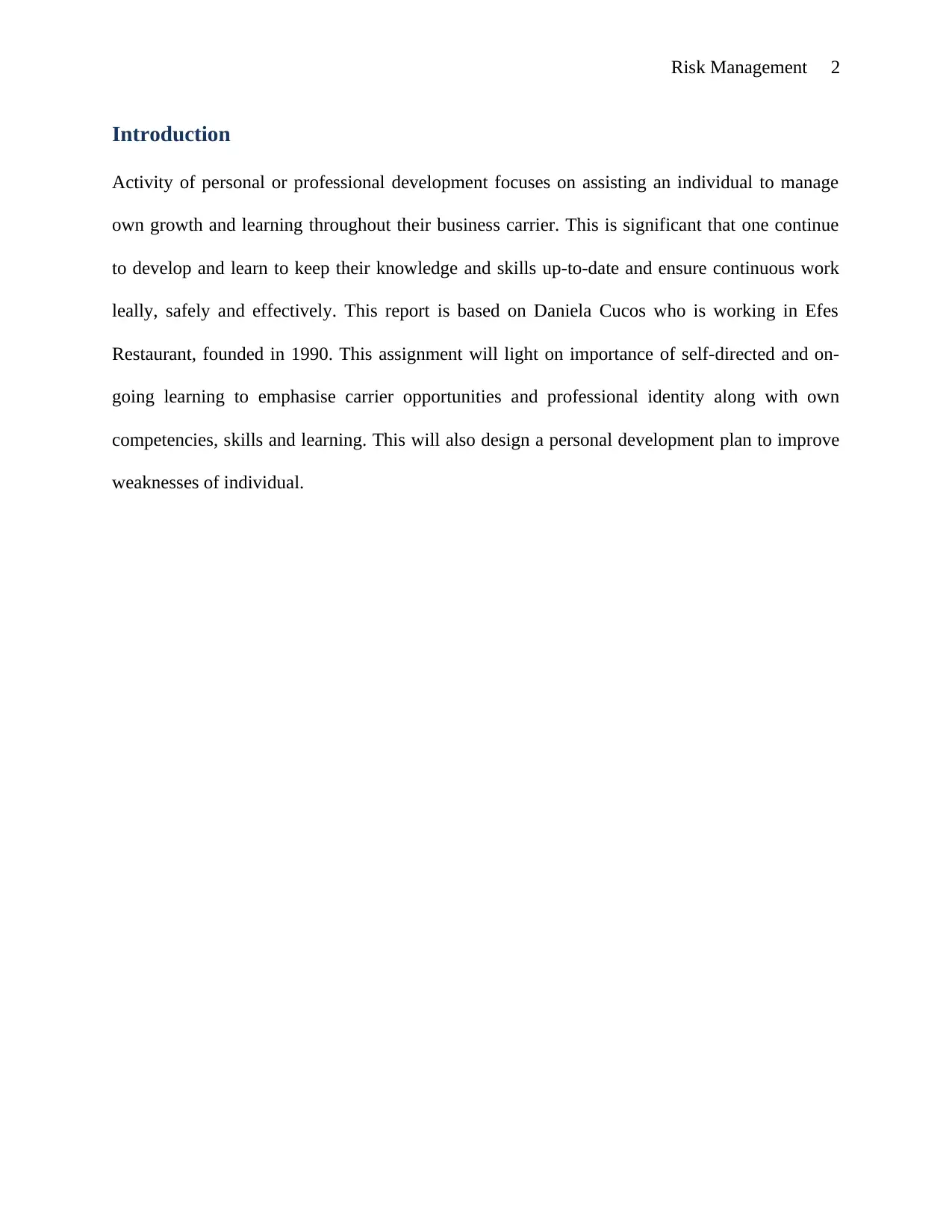
Risk Management 2
Introduction
Activity of personal or professional development focuses on assisting an individual to manage
own growth and learning throughout their business carrier. This is significant that one continue
to develop and learn to keep their knowledge and skills up-to-date and ensure continuous work
leally, safely and effectively. This report is based on Daniela Cucos who is working in Efes
Restaurant, founded in 1990. This assignment will light on importance of self-directed and on-
going learning to emphasise carrier opportunities and professional identity along with own
competencies, skills and learning. This will also design a personal development plan to improve
weaknesses of individual.
Introduction
Activity of personal or professional development focuses on assisting an individual to manage
own growth and learning throughout their business carrier. This is significant that one continue
to develop and learn to keep their knowledge and skills up-to-date and ensure continuous work
leally, safely and effectively. This report is based on Daniela Cucos who is working in Efes
Restaurant, founded in 1990. This assignment will light on importance of self-directed and on-
going learning to emphasise carrier opportunities and professional identity along with own
competencies, skills and learning. This will also design a personal development plan to improve
weaknesses of individual.
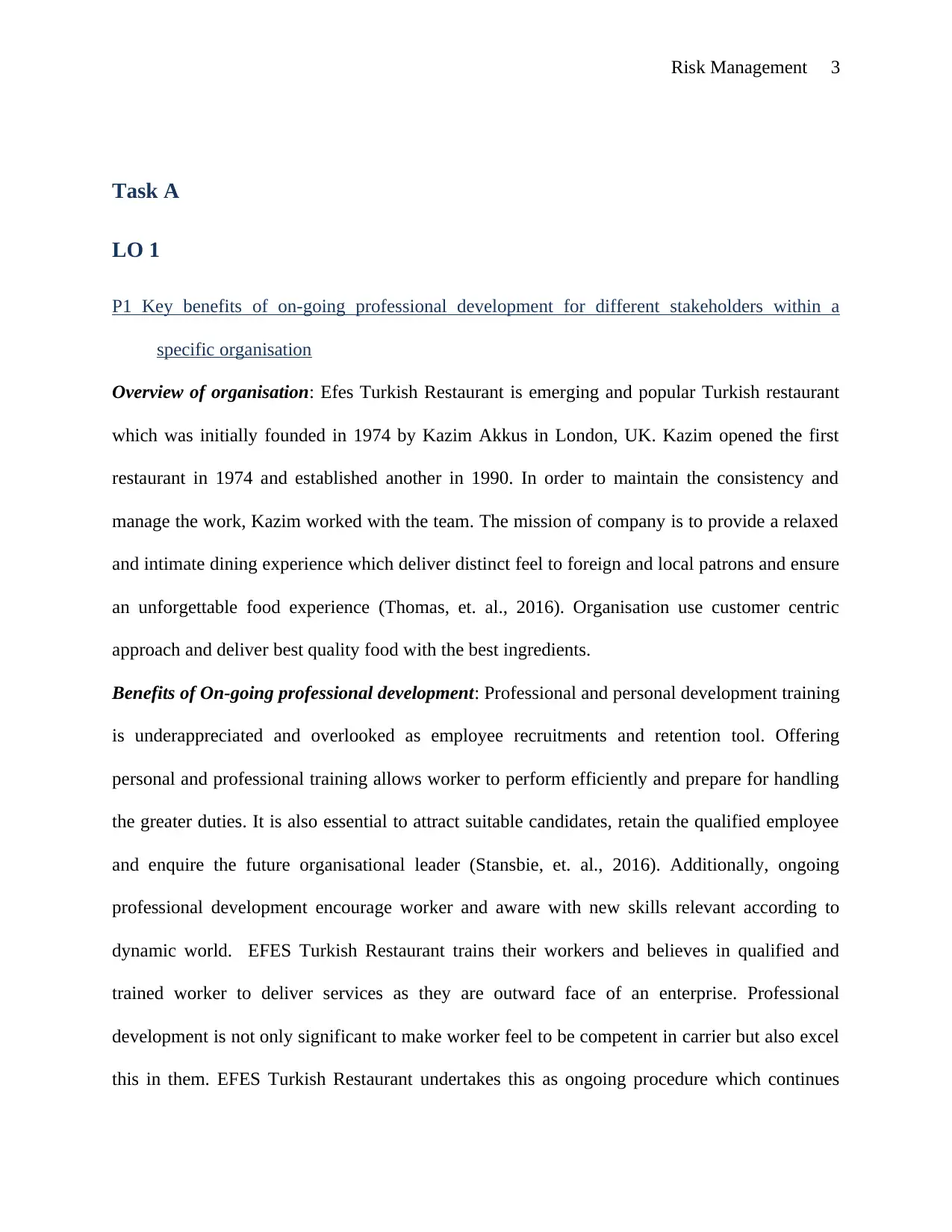
Risk Management 3
Task A
LO 1
P1 Key benefits of on-going professional development for different stakeholders within a
specific organisation
Overview of organisation: Efes Turkish Restaurant is emerging and popular Turkish restaurant
which was initially founded in 1974 by Kazim Akkus in London, UK. Kazim opened the first
restaurant in 1974 and established another in 1990. In order to maintain the consistency and
manage the work, Kazim worked with the team. The mission of company is to provide a relaxed
and intimate dining experience which deliver distinct feel to foreign and local patrons and ensure
an unforgettable food experience (Thomas, et. al., 2016). Organisation use customer centric
approach and deliver best quality food with the best ingredients.
Benefits of On-going professional development: Professional and personal development training
is underappreciated and overlooked as employee recruitments and retention tool. Offering
personal and professional training allows worker to perform efficiently and prepare for handling
the greater duties. It is also essential to attract suitable candidates, retain the qualified employee
and enquire the future organisational leader (Stansbie, et. al., 2016). Additionally, ongoing
professional development encourage worker and aware with new skills relevant according to
dynamic world. EFES Turkish Restaurant trains their workers and believes in qualified and
trained worker to deliver services as they are outward face of an enterprise. Professional
development is not only significant to make worker feel to be competent in carrier but also excel
this in them. EFES Turkish Restaurant undertakes this as ongoing procedure which continues
Task A
LO 1
P1 Key benefits of on-going professional development for different stakeholders within a
specific organisation
Overview of organisation: Efes Turkish Restaurant is emerging and popular Turkish restaurant
which was initially founded in 1974 by Kazim Akkus in London, UK. Kazim opened the first
restaurant in 1974 and established another in 1990. In order to maintain the consistency and
manage the work, Kazim worked with the team. The mission of company is to provide a relaxed
and intimate dining experience which deliver distinct feel to foreign and local patrons and ensure
an unforgettable food experience (Thomas, et. al., 2016). Organisation use customer centric
approach and deliver best quality food with the best ingredients.
Benefits of On-going professional development: Professional and personal development training
is underappreciated and overlooked as employee recruitments and retention tool. Offering
personal and professional training allows worker to perform efficiently and prepare for handling
the greater duties. It is also essential to attract suitable candidates, retain the qualified employee
and enquire the future organisational leader (Stansbie, et. al., 2016). Additionally, ongoing
professional development encourage worker and aware with new skills relevant according to
dynamic world. EFES Turkish Restaurant trains their workers and believes in qualified and
trained worker to deliver services as they are outward face of an enterprise. Professional
development is not only significant to make worker feel to be competent in carrier but also excel
this in them. EFES Turkish Restaurant undertakes this as ongoing procedure which continues
Secure Best Marks with AI Grader
Need help grading? Try our AI Grader for instant feedback on your assignments.
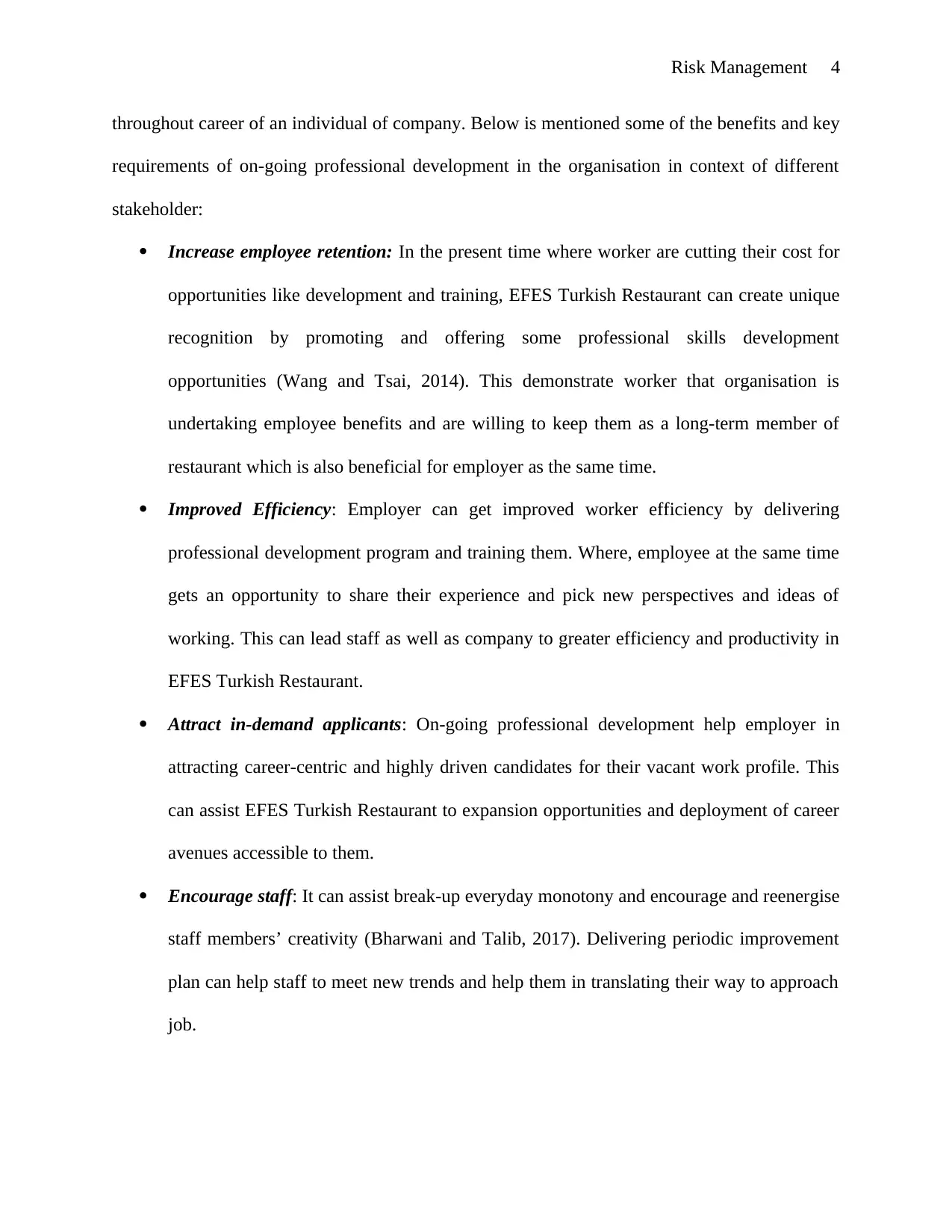
Risk Management 4
throughout career of an individual of company. Below is mentioned some of the benefits and key
requirements of on-going professional development in the organisation in context of different
stakeholder:
Increase employee retention: In the present time where worker are cutting their cost for
opportunities like development and training, EFES Turkish Restaurant can create unique
recognition by promoting and offering some professional skills development
opportunities (Wang and Tsai, 2014). This demonstrate worker that organisation is
undertaking employee benefits and are willing to keep them as a long-term member of
restaurant which is also beneficial for employer as the same time.
Improved Efficiency: Employer can get improved worker efficiency by delivering
professional development program and training them. Where, employee at the same time
gets an opportunity to share their experience and pick new perspectives and ideas of
working. This can lead staff as well as company to greater efficiency and productivity in
EFES Turkish Restaurant.
Attract in-demand applicants: On-going professional development help employer in
attracting career-centric and highly driven candidates for their vacant work profile. This
can assist EFES Turkish Restaurant to expansion opportunities and deployment of career
avenues accessible to them.
Encourage staff: It can assist break-up everyday monotony and encourage and reenergise
staff members’ creativity (Bharwani and Talib, 2017). Delivering periodic improvement
plan can help staff to meet new trends and help them in translating their way to approach
job.
throughout career of an individual of company. Below is mentioned some of the benefits and key
requirements of on-going professional development in the organisation in context of different
stakeholder:
Increase employee retention: In the present time where worker are cutting their cost for
opportunities like development and training, EFES Turkish Restaurant can create unique
recognition by promoting and offering some professional skills development
opportunities (Wang and Tsai, 2014). This demonstrate worker that organisation is
undertaking employee benefits and are willing to keep them as a long-term member of
restaurant which is also beneficial for employer as the same time.
Improved Efficiency: Employer can get improved worker efficiency by delivering
professional development program and training them. Where, employee at the same time
gets an opportunity to share their experience and pick new perspectives and ideas of
working. This can lead staff as well as company to greater efficiency and productivity in
EFES Turkish Restaurant.
Attract in-demand applicants: On-going professional development help employer in
attracting career-centric and highly driven candidates for their vacant work profile. This
can assist EFES Turkish Restaurant to expansion opportunities and deployment of career
avenues accessible to them.
Encourage staff: It can assist break-up everyday monotony and encourage and reenergise
staff members’ creativity (Bharwani and Talib, 2017). Delivering periodic improvement
plan can help staff to meet new trends and help them in translating their way to approach
job.
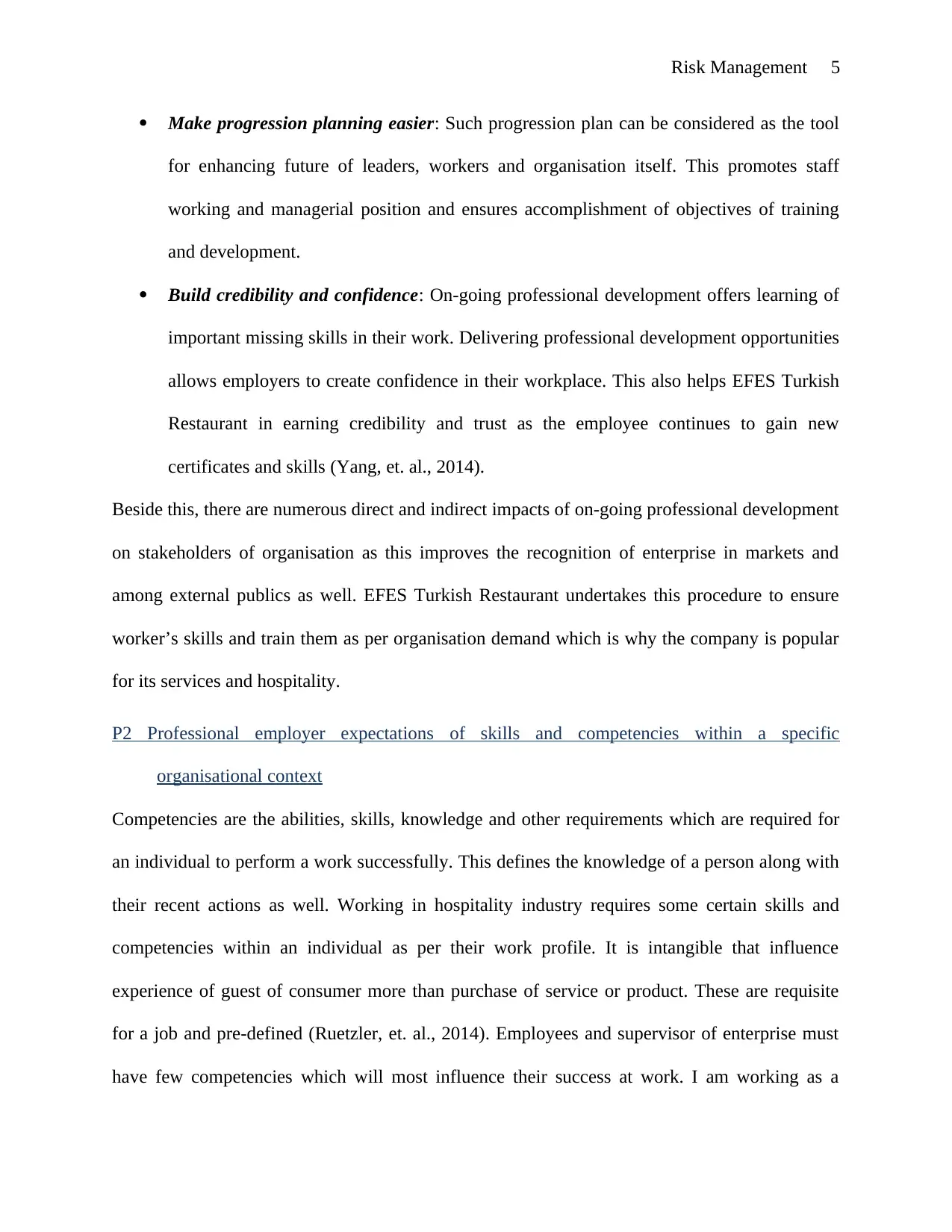
Risk Management 5
Make progression planning easier: Such progression plan can be considered as the tool
for enhancing future of leaders, workers and organisation itself. This promotes staff
working and managerial position and ensures accomplishment of objectives of training
and development.
Build credibility and confidence: On-going professional development offers learning of
important missing skills in their work. Delivering professional development opportunities
allows employers to create confidence in their workplace. This also helps EFES Turkish
Restaurant in earning credibility and trust as the employee continues to gain new
certificates and skills (Yang, et. al., 2014).
Beside this, there are numerous direct and indirect impacts of on-going professional development
on stakeholders of organisation as this improves the recognition of enterprise in markets and
among external publics as well. EFES Turkish Restaurant undertakes this procedure to ensure
worker’s skills and train them as per organisation demand which is why the company is popular
for its services and hospitality.
P2 Professional employer expectations of skills and competencies within a specific
organisational context
Competencies are the abilities, skills, knowledge and other requirements which are required for
an individual to perform a work successfully. This defines the knowledge of a person along with
their recent actions as well. Working in hospitality industry requires some certain skills and
competencies within an individual as per their work profile. It is intangible that influence
experience of guest of consumer more than purchase of service or product. These are requisite
for a job and pre-defined (Ruetzler, et. al., 2014). Employees and supervisor of enterprise must
have few competencies which will most influence their success at work. I am working as a
Make progression planning easier: Such progression plan can be considered as the tool
for enhancing future of leaders, workers and organisation itself. This promotes staff
working and managerial position and ensures accomplishment of objectives of training
and development.
Build credibility and confidence: On-going professional development offers learning of
important missing skills in their work. Delivering professional development opportunities
allows employers to create confidence in their workplace. This also helps EFES Turkish
Restaurant in earning credibility and trust as the employee continues to gain new
certificates and skills (Yang, et. al., 2014).
Beside this, there are numerous direct and indirect impacts of on-going professional development
on stakeholders of organisation as this improves the recognition of enterprise in markets and
among external publics as well. EFES Turkish Restaurant undertakes this procedure to ensure
worker’s skills and train them as per organisation demand which is why the company is popular
for its services and hospitality.
P2 Professional employer expectations of skills and competencies within a specific
organisational context
Competencies are the abilities, skills, knowledge and other requirements which are required for
an individual to perform a work successfully. This defines the knowledge of a person along with
their recent actions as well. Working in hospitality industry requires some certain skills and
competencies within an individual as per their work profile. It is intangible that influence
experience of guest of consumer more than purchase of service or product. These are requisite
for a job and pre-defined (Ruetzler, et. al., 2014). Employees and supervisor of enterprise must
have few competencies which will most influence their success at work. I am working as a
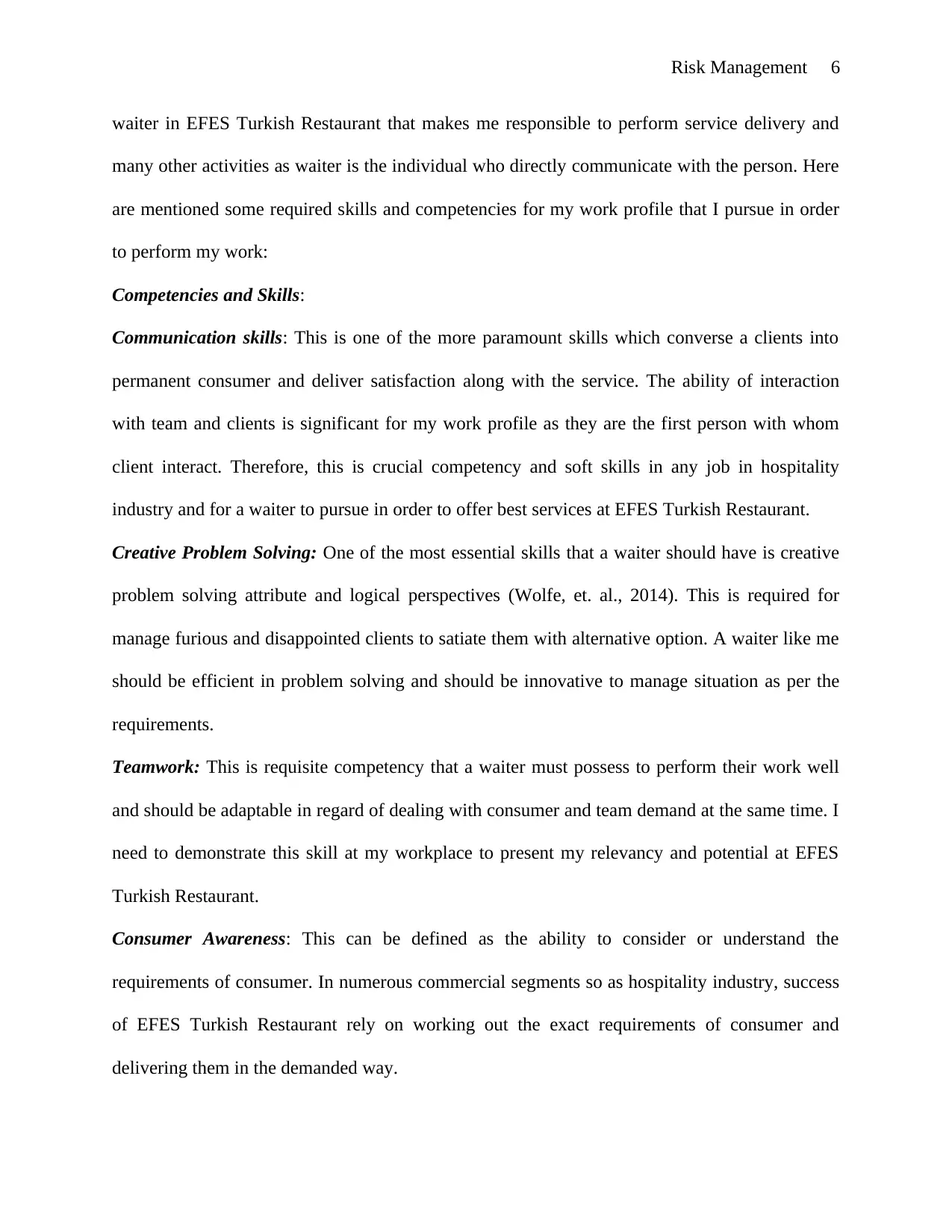
Risk Management 6
waiter in EFES Turkish Restaurant that makes me responsible to perform service delivery and
many other activities as waiter is the individual who directly communicate with the person. Here
are mentioned some required skills and competencies for my work profile that I pursue in order
to perform my work:
Competencies and Skills:
Communication skills: This is one of the more paramount skills which converse a clients into
permanent consumer and deliver satisfaction along with the service. The ability of interaction
with team and clients is significant for my work profile as they are the first person with whom
client interact. Therefore, this is crucial competency and soft skills in any job in hospitality
industry and for a waiter to pursue in order to offer best services at EFES Turkish Restaurant.
Creative Problem Solving: One of the most essential skills that a waiter should have is creative
problem solving attribute and logical perspectives (Wolfe, et. al., 2014). This is required for
manage furious and disappointed clients to satiate them with alternative option. A waiter like me
should be efficient in problem solving and should be innovative to manage situation as per the
requirements.
Teamwork: This is requisite competency that a waiter must possess to perform their work well
and should be adaptable in regard of dealing with consumer and team demand at the same time. I
need to demonstrate this skill at my workplace to present my relevancy and potential at EFES
Turkish Restaurant.
Consumer Awareness: This can be defined as the ability to consider or understand the
requirements of consumer. In numerous commercial segments so as hospitality industry, success
of EFES Turkish Restaurant rely on working out the exact requirements of consumer and
delivering them in the demanded way.
waiter in EFES Turkish Restaurant that makes me responsible to perform service delivery and
many other activities as waiter is the individual who directly communicate with the person. Here
are mentioned some required skills and competencies for my work profile that I pursue in order
to perform my work:
Competencies and Skills:
Communication skills: This is one of the more paramount skills which converse a clients into
permanent consumer and deliver satisfaction along with the service. The ability of interaction
with team and clients is significant for my work profile as they are the first person with whom
client interact. Therefore, this is crucial competency and soft skills in any job in hospitality
industry and for a waiter to pursue in order to offer best services at EFES Turkish Restaurant.
Creative Problem Solving: One of the most essential skills that a waiter should have is creative
problem solving attribute and logical perspectives (Wolfe, et. al., 2014). This is required for
manage furious and disappointed clients to satiate them with alternative option. A waiter like me
should be efficient in problem solving and should be innovative to manage situation as per the
requirements.
Teamwork: This is requisite competency that a waiter must possess to perform their work well
and should be adaptable in regard of dealing with consumer and team demand at the same time. I
need to demonstrate this skill at my workplace to present my relevancy and potential at EFES
Turkish Restaurant.
Consumer Awareness: This can be defined as the ability to consider or understand the
requirements of consumer. In numerous commercial segments so as hospitality industry, success
of EFES Turkish Restaurant rely on working out the exact requirements of consumer and
delivering them in the demanded way.
Paraphrase This Document
Need a fresh take? Get an instant paraphrase of this document with our AI Paraphraser
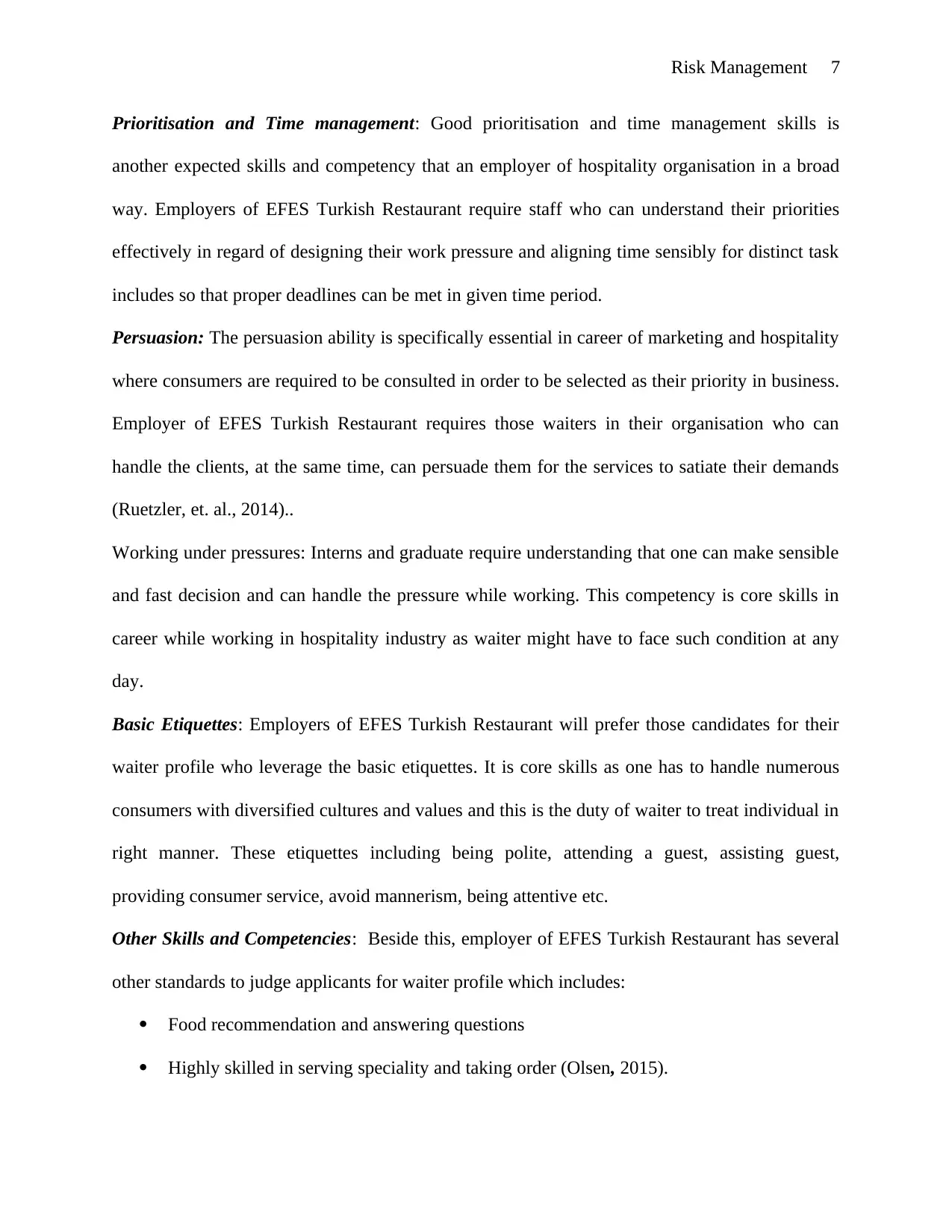
Risk Management 7
Prioritisation and Time management: Good prioritisation and time management skills is
another expected skills and competency that an employer of hospitality organisation in a broad
way. Employers of EFES Turkish Restaurant require staff who can understand their priorities
effectively in regard of designing their work pressure and aligning time sensibly for distinct task
includes so that proper deadlines can be met in given time period.
Persuasion: The persuasion ability is specifically essential in career of marketing and hospitality
where consumers are required to be consulted in order to be selected as their priority in business.
Employer of EFES Turkish Restaurant requires those waiters in their organisation who can
handle the clients, at the same time, can persuade them for the services to satiate their demands
(Ruetzler, et. al., 2014)..
Working under pressures: Interns and graduate require understanding that one can make sensible
and fast decision and can handle the pressure while working. This competency is core skills in
career while working in hospitality industry as waiter might have to face such condition at any
day.
Basic Etiquettes: Employers of EFES Turkish Restaurant will prefer those candidates for their
waiter profile who leverage the basic etiquettes. It is core skills as one has to handle numerous
consumers with diversified cultures and values and this is the duty of waiter to treat individual in
right manner. These etiquettes including being polite, attending a guest, assisting guest,
providing consumer service, avoid mannerism, being attentive etc.
Other Skills and Competencies: Beside this, employer of EFES Turkish Restaurant has several
other standards to judge applicants for waiter profile which includes:
Food recommendation and answering questions
Highly skilled in serving speciality and taking order (Olsen, 2015).
Prioritisation and Time management: Good prioritisation and time management skills is
another expected skills and competency that an employer of hospitality organisation in a broad
way. Employers of EFES Turkish Restaurant require staff who can understand their priorities
effectively in regard of designing their work pressure and aligning time sensibly for distinct task
includes so that proper deadlines can be met in given time period.
Persuasion: The persuasion ability is specifically essential in career of marketing and hospitality
where consumers are required to be consulted in order to be selected as their priority in business.
Employer of EFES Turkish Restaurant requires those waiters in their organisation who can
handle the clients, at the same time, can persuade them for the services to satiate their demands
(Ruetzler, et. al., 2014)..
Working under pressures: Interns and graduate require understanding that one can make sensible
and fast decision and can handle the pressure while working. This competency is core skills in
career while working in hospitality industry as waiter might have to face such condition at any
day.
Basic Etiquettes: Employers of EFES Turkish Restaurant will prefer those candidates for their
waiter profile who leverage the basic etiquettes. It is core skills as one has to handle numerous
consumers with diversified cultures and values and this is the duty of waiter to treat individual in
right manner. These etiquettes including being polite, attending a guest, assisting guest,
providing consumer service, avoid mannerism, being attentive etc.
Other Skills and Competencies: Beside this, employer of EFES Turkish Restaurant has several
other standards to judge applicants for waiter profile which includes:
Food recommendation and answering questions
Highly skilled in serving speciality and taking order (Olsen, 2015).
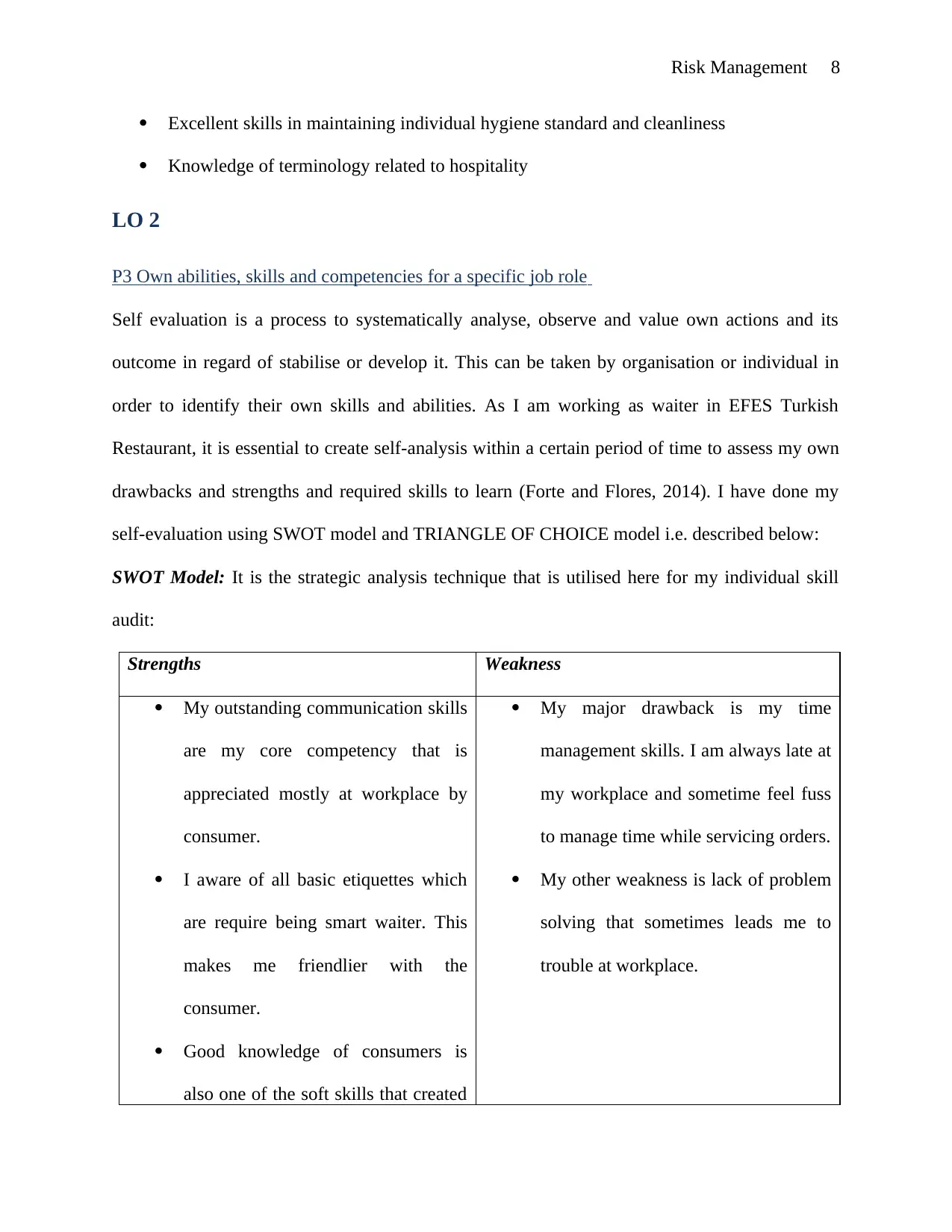
Risk Management 8
Excellent skills in maintaining individual hygiene standard and cleanliness
Knowledge of terminology related to hospitality
LO 2
P3 Own abilities, skills and competencies for a specific job role
Self evaluation is a process to systematically analyse, observe and value own actions and its
outcome in regard of stabilise or develop it. This can be taken by organisation or individual in
order to identify their own skills and abilities. As I am working as waiter in EFES Turkish
Restaurant, it is essential to create self-analysis within a certain period of time to assess my own
drawbacks and strengths and required skills to learn (Forte and Flores, 2014). I have done my
self-evaluation using SWOT model and TRIANGLE OF CHOICE model i.e. described below:
SWOT Model: It is the strategic analysis technique that is utilised here for my individual skill
audit:
Strengths Weakness
My outstanding communication skills
are my core competency that is
appreciated mostly at workplace by
consumer.
I aware of all basic etiquettes which
are require being smart waiter. This
makes me friendlier with the
consumer.
Good knowledge of consumers is
also one of the soft skills that created
My major drawback is my time
management skills. I am always late at
my workplace and sometime feel fuss
to manage time while servicing orders.
My other weakness is lack of problem
solving that sometimes leads me to
trouble at workplace.
Excellent skills in maintaining individual hygiene standard and cleanliness
Knowledge of terminology related to hospitality
LO 2
P3 Own abilities, skills and competencies for a specific job role
Self evaluation is a process to systematically analyse, observe and value own actions and its
outcome in regard of stabilise or develop it. This can be taken by organisation or individual in
order to identify their own skills and abilities. As I am working as waiter in EFES Turkish
Restaurant, it is essential to create self-analysis within a certain period of time to assess my own
drawbacks and strengths and required skills to learn (Forte and Flores, 2014). I have done my
self-evaluation using SWOT model and TRIANGLE OF CHOICE model i.e. described below:
SWOT Model: It is the strategic analysis technique that is utilised here for my individual skill
audit:
Strengths Weakness
My outstanding communication skills
are my core competency that is
appreciated mostly at workplace by
consumer.
I aware of all basic etiquettes which
are require being smart waiter. This
makes me friendlier with the
consumer.
Good knowledge of consumers is
also one of the soft skills that created
My major drawback is my time
management skills. I am always late at
my workplace and sometime feel fuss
to manage time while servicing orders.
My other weakness is lack of problem
solving that sometimes leads me to
trouble at workplace.
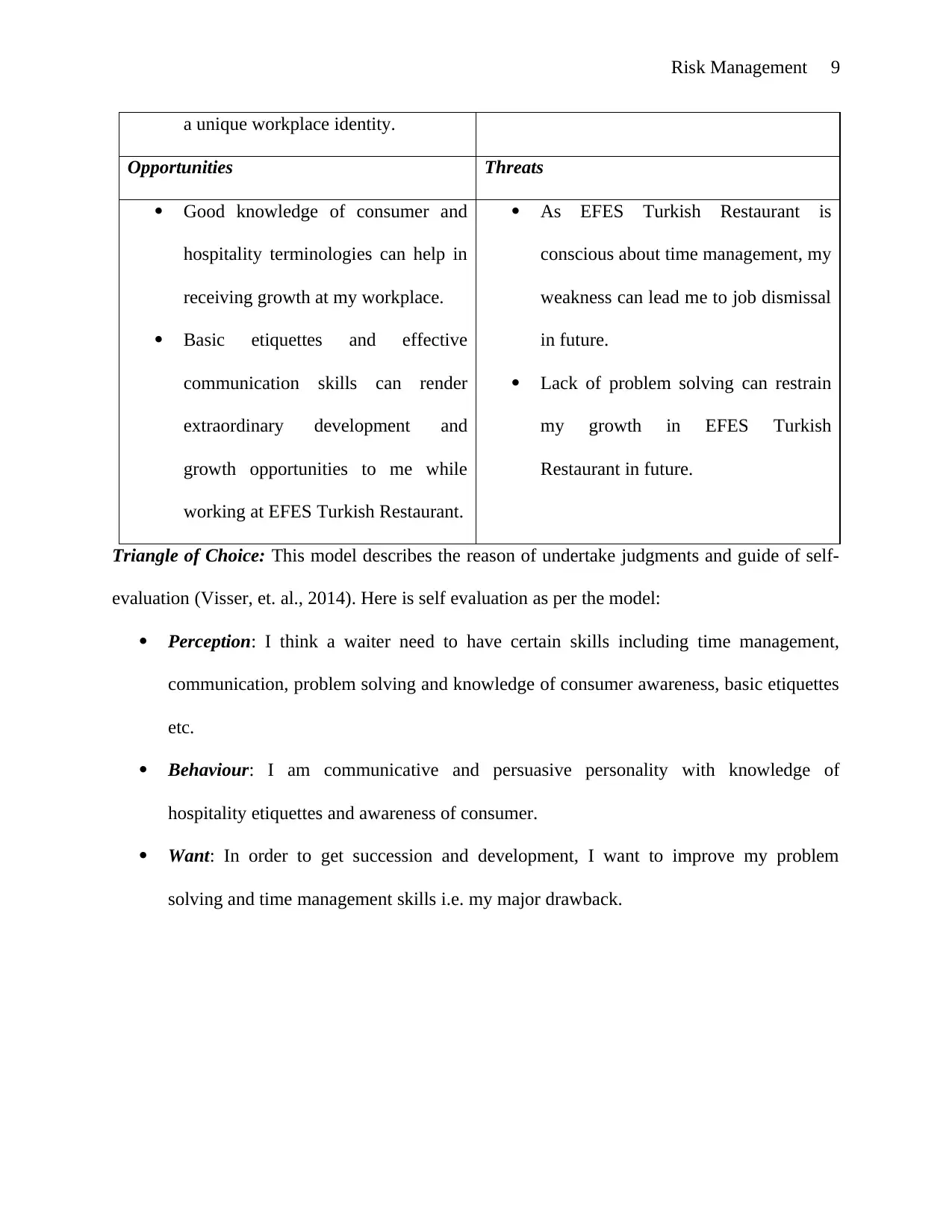
Risk Management 9
a unique workplace identity.
Opportunities Threats
Good knowledge of consumer and
hospitality terminologies can help in
receiving growth at my workplace.
Basic etiquettes and effective
communication skills can render
extraordinary development and
growth opportunities to me while
working at EFES Turkish Restaurant.
As EFES Turkish Restaurant is
conscious about time management, my
weakness can lead me to job dismissal
in future.
Lack of problem solving can restrain
my growth in EFES Turkish
Restaurant in future.
Triangle of Choice: This model describes the reason of undertake judgments and guide of self-
evaluation (Visser, et. al., 2014). Here is self evaluation as per the model:
Perception: I think a waiter need to have certain skills including time management,
communication, problem solving and knowledge of consumer awareness, basic etiquettes
etc.
Behaviour: I am communicative and persuasive personality with knowledge of
hospitality etiquettes and awareness of consumer.
Want: In order to get succession and development, I want to improve my problem
solving and time management skills i.e. my major drawback.
a unique workplace identity.
Opportunities Threats
Good knowledge of consumer and
hospitality terminologies can help in
receiving growth at my workplace.
Basic etiquettes and effective
communication skills can render
extraordinary development and
growth opportunities to me while
working at EFES Turkish Restaurant.
As EFES Turkish Restaurant is
conscious about time management, my
weakness can lead me to job dismissal
in future.
Lack of problem solving can restrain
my growth in EFES Turkish
Restaurant in future.
Triangle of Choice: This model describes the reason of undertake judgments and guide of self-
evaluation (Visser, et. al., 2014). Here is self evaluation as per the model:
Perception: I think a waiter need to have certain skills including time management,
communication, problem solving and knowledge of consumer awareness, basic etiquettes
etc.
Behaviour: I am communicative and persuasive personality with knowledge of
hospitality etiquettes and awareness of consumer.
Want: In order to get succession and development, I want to improve my problem
solving and time management skills i.e. my major drawback.
Secure Best Marks with AI Grader
Need help grading? Try our AI Grader for instant feedback on your assignments.
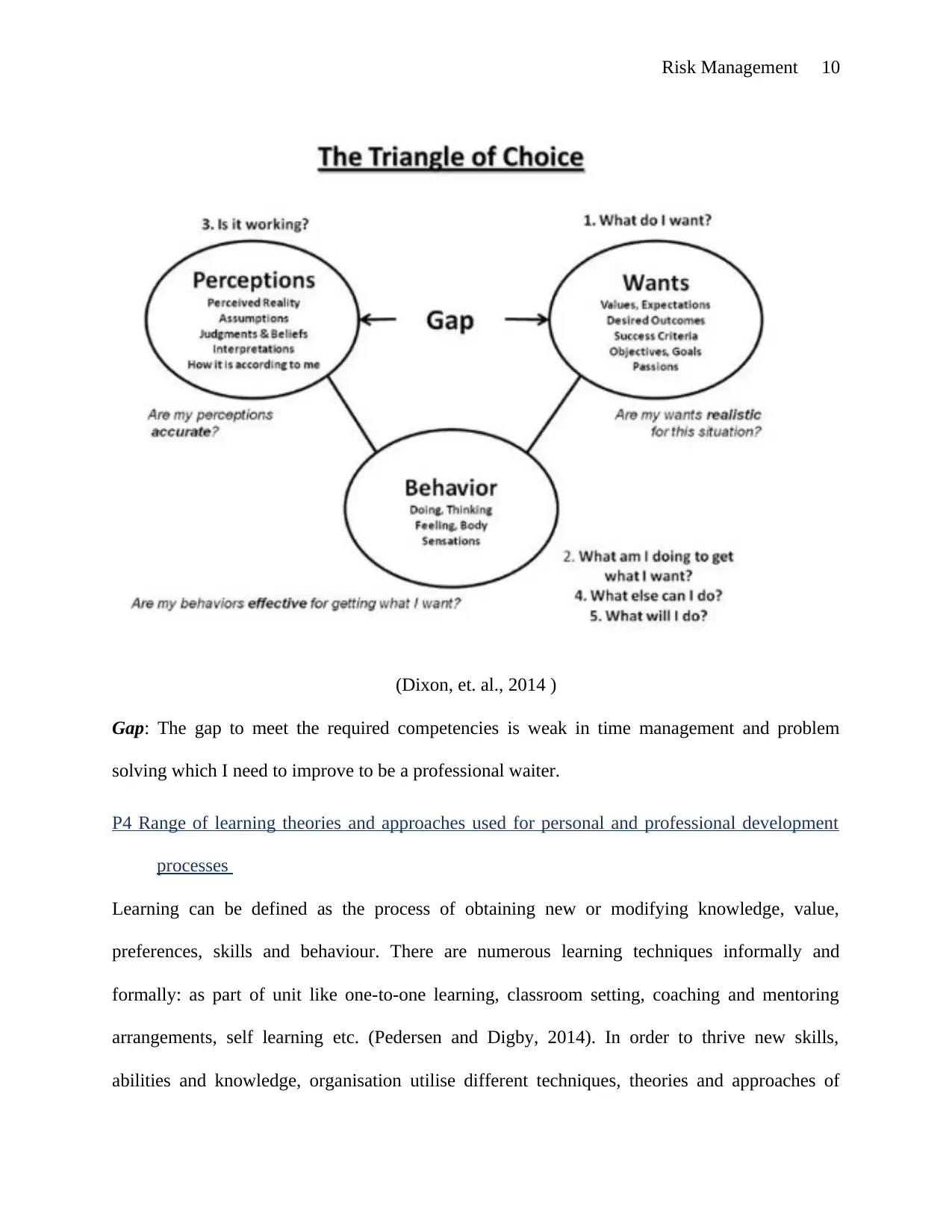
Risk Management 10
(Dixon, et. al., 2014 )
Gap: The gap to meet the required competencies is weak in time management and problem
solving which I need to improve to be a professional waiter.
P4 Range of learning theories and approaches used for personal and professional development
processes
Learning can be defined as the process of obtaining new or modifying knowledge, value,
preferences, skills and behaviour. There are numerous learning techniques informally and
formally: as part of unit like one-to-one learning, classroom setting, coaching and mentoring
arrangements, self learning etc. (Pedersen and Digby, 2014). In order to thrive new skills,
abilities and knowledge, organisation utilise different techniques, theories and approaches of
(Dixon, et. al., 2014 )
Gap: The gap to meet the required competencies is weak in time management and problem
solving which I need to improve to be a professional waiter.
P4 Range of learning theories and approaches used for personal and professional development
processes
Learning can be defined as the process of obtaining new or modifying knowledge, value,
preferences, skills and behaviour. There are numerous learning techniques informally and
formally: as part of unit like one-to-one learning, classroom setting, coaching and mentoring
arrangements, self learning etc. (Pedersen and Digby, 2014). In order to thrive new skills,
abilities and knowledge, organisation utilise different techniques, theories and approaches of
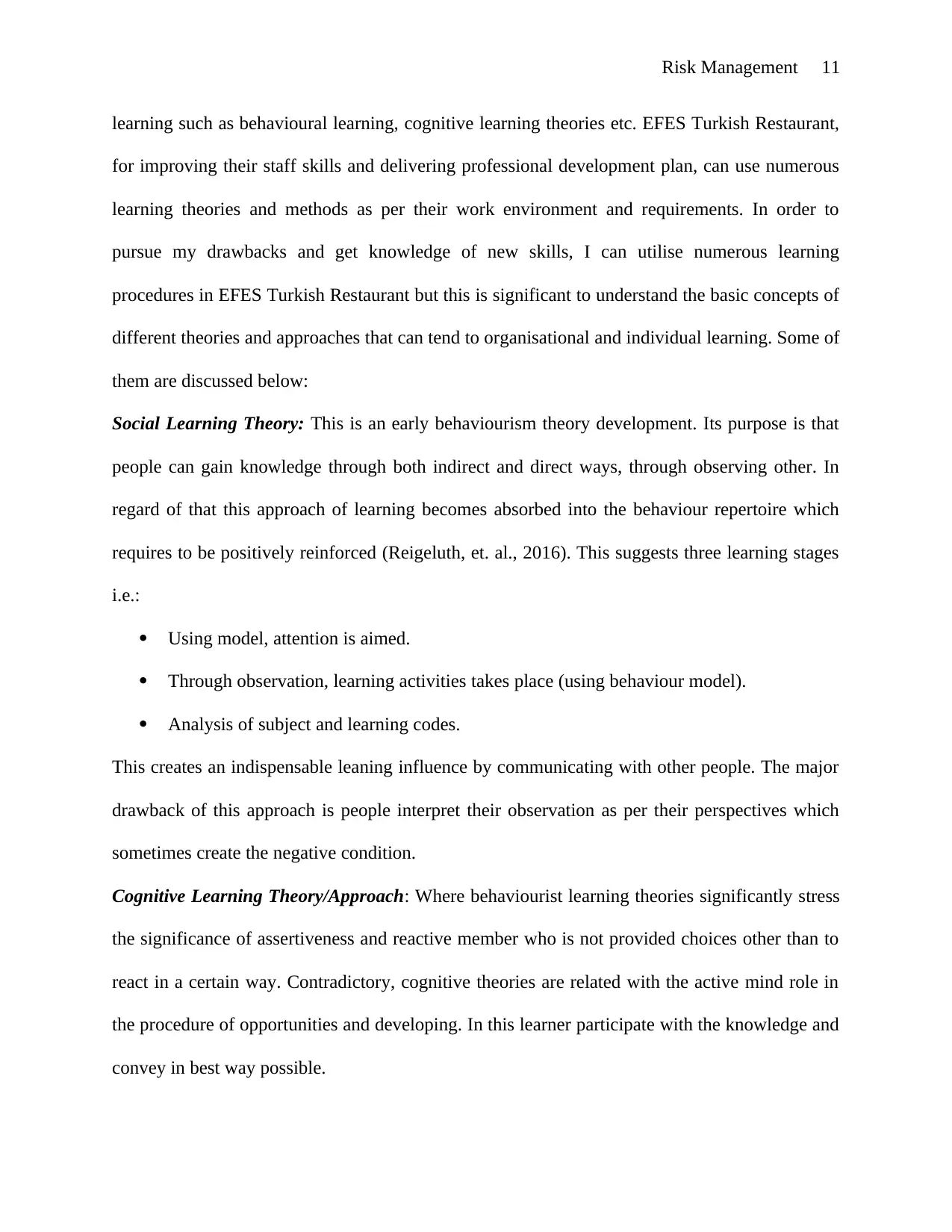
Risk Management 11
learning such as behavioural learning, cognitive learning theories etc. EFES Turkish Restaurant,
for improving their staff skills and delivering professional development plan, can use numerous
learning theories and methods as per their work environment and requirements. In order to
pursue my drawbacks and get knowledge of new skills, I can utilise numerous learning
procedures in EFES Turkish Restaurant but this is significant to understand the basic concepts of
different theories and approaches that can tend to organisational and individual learning. Some of
them are discussed below:
Social Learning Theory: This is an early behaviourism theory development. Its purpose is that
people can gain knowledge through both indirect and direct ways, through observing other. In
regard of that this approach of learning becomes absorbed into the behaviour repertoire which
requires to be positively reinforced (Reigeluth, et. al., 2016). This suggests three learning stages
i.e.:
Using model, attention is aimed.
Through observation, learning activities takes place (using behaviour model).
Analysis of subject and learning codes.
This creates an indispensable leaning influence by communicating with other people. The major
drawback of this approach is people interpret their observation as per their perspectives which
sometimes create the negative condition.
Cognitive Learning Theory/Approach: Where behaviourist learning theories significantly stress
the significance of assertiveness and reactive member who is not provided choices other than to
react in a certain way. Contradictory, cognitive theories are related with the active mind role in
the procedure of opportunities and developing. In this learner participate with the knowledge and
convey in best way possible.
learning such as behavioural learning, cognitive learning theories etc. EFES Turkish Restaurant,
for improving their staff skills and delivering professional development plan, can use numerous
learning theories and methods as per their work environment and requirements. In order to
pursue my drawbacks and get knowledge of new skills, I can utilise numerous learning
procedures in EFES Turkish Restaurant but this is significant to understand the basic concepts of
different theories and approaches that can tend to organisational and individual learning. Some of
them are discussed below:
Social Learning Theory: This is an early behaviourism theory development. Its purpose is that
people can gain knowledge through both indirect and direct ways, through observing other. In
regard of that this approach of learning becomes absorbed into the behaviour repertoire which
requires to be positively reinforced (Reigeluth, et. al., 2016). This suggests three learning stages
i.e.:
Using model, attention is aimed.
Through observation, learning activities takes place (using behaviour model).
Analysis of subject and learning codes.
This creates an indispensable leaning influence by communicating with other people. The major
drawback of this approach is people interpret their observation as per their perspectives which
sometimes create the negative condition.
Cognitive Learning Theory/Approach: Where behaviourist learning theories significantly stress
the significance of assertiveness and reactive member who is not provided choices other than to
react in a certain way. Contradictory, cognitive theories are related with the active mind role in
the procedure of opportunities and developing. In this learner participate with the knowledge and
convey in best way possible.
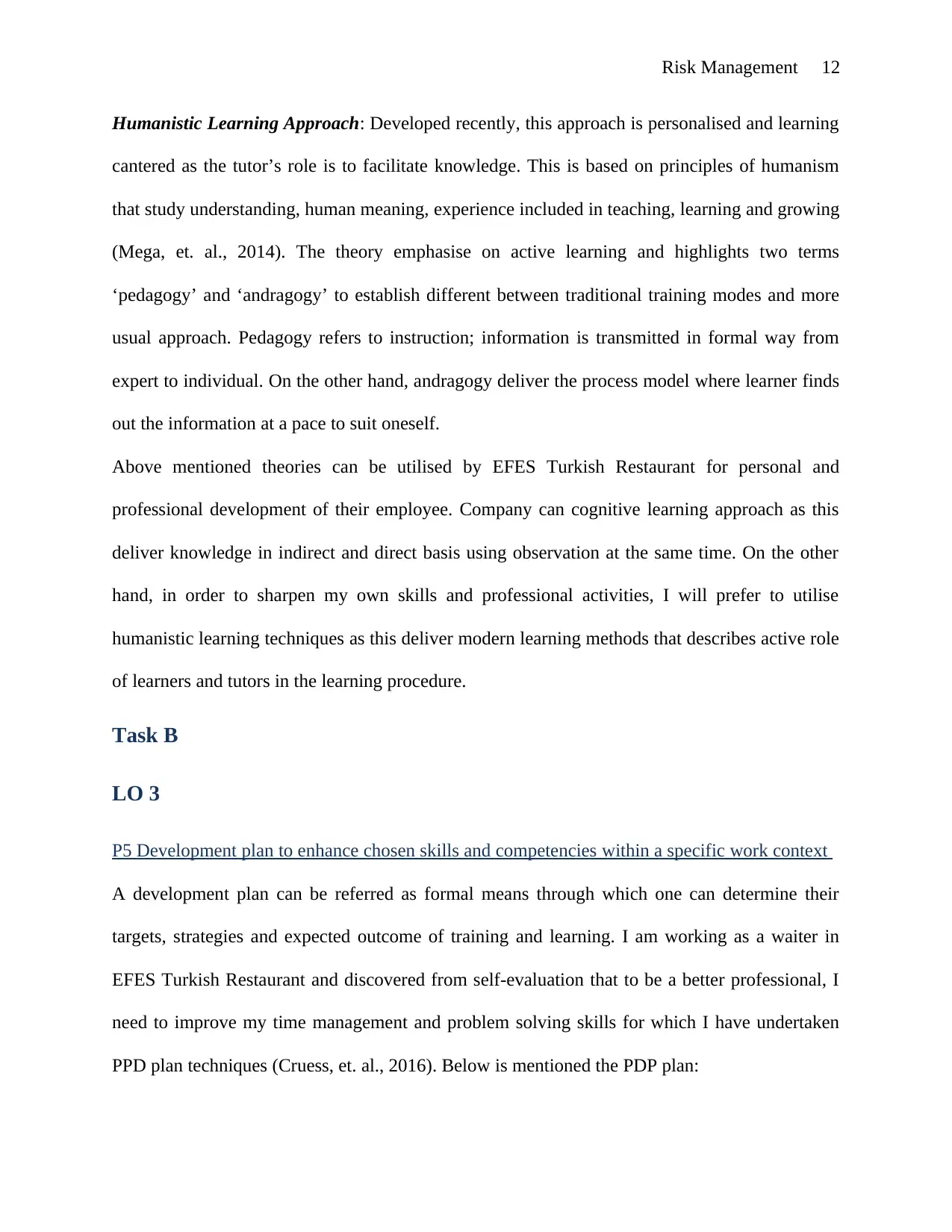
Risk Management 12
Humanistic Learning Approach: Developed recently, this approach is personalised and learning
cantered as the tutor’s role is to facilitate knowledge. This is based on principles of humanism
that study understanding, human meaning, experience included in teaching, learning and growing
(Mega, et. al., 2014). The theory emphasise on active learning and highlights two terms
‘pedagogy’ and ‘andragogy’ to establish different between traditional training modes and more
usual approach. Pedagogy refers to instruction; information is transmitted in formal way from
expert to individual. On the other hand, andragogy deliver the process model where learner finds
out the information at a pace to suit oneself.
Above mentioned theories can be utilised by EFES Turkish Restaurant for personal and
professional development of their employee. Company can cognitive learning approach as this
deliver knowledge in indirect and direct basis using observation at the same time. On the other
hand, in order to sharpen my own skills and professional activities, I will prefer to utilise
humanistic learning techniques as this deliver modern learning methods that describes active role
of learners and tutors in the learning procedure.
Task B
LO 3
P5 Development plan to enhance chosen skills and competencies within a specific work context
A development plan can be referred as formal means through which one can determine their
targets, strategies and expected outcome of training and learning. I am working as a waiter in
EFES Turkish Restaurant and discovered from self-evaluation that to be a better professional, I
need to improve my time management and problem solving skills for which I have undertaken
PPD plan techniques (Cruess, et. al., 2016). Below is mentioned the PDP plan:
Humanistic Learning Approach: Developed recently, this approach is personalised and learning
cantered as the tutor’s role is to facilitate knowledge. This is based on principles of humanism
that study understanding, human meaning, experience included in teaching, learning and growing
(Mega, et. al., 2014). The theory emphasise on active learning and highlights two terms
‘pedagogy’ and ‘andragogy’ to establish different between traditional training modes and more
usual approach. Pedagogy refers to instruction; information is transmitted in formal way from
expert to individual. On the other hand, andragogy deliver the process model where learner finds
out the information at a pace to suit oneself.
Above mentioned theories can be utilised by EFES Turkish Restaurant for personal and
professional development of their employee. Company can cognitive learning approach as this
deliver knowledge in indirect and direct basis using observation at the same time. On the other
hand, in order to sharpen my own skills and professional activities, I will prefer to utilise
humanistic learning techniques as this deliver modern learning methods that describes active role
of learners and tutors in the learning procedure.
Task B
LO 3
P5 Development plan to enhance chosen skills and competencies within a specific work context
A development plan can be referred as formal means through which one can determine their
targets, strategies and expected outcome of training and learning. I am working as a waiter in
EFES Turkish Restaurant and discovered from self-evaluation that to be a better professional, I
need to improve my time management and problem solving skills for which I have undertaken
PPD plan techniques (Cruess, et. al., 2016). Below is mentioned the PDP plan:
Paraphrase This Document
Need a fresh take? Get an instant paraphrase of this document with our AI Paraphraser
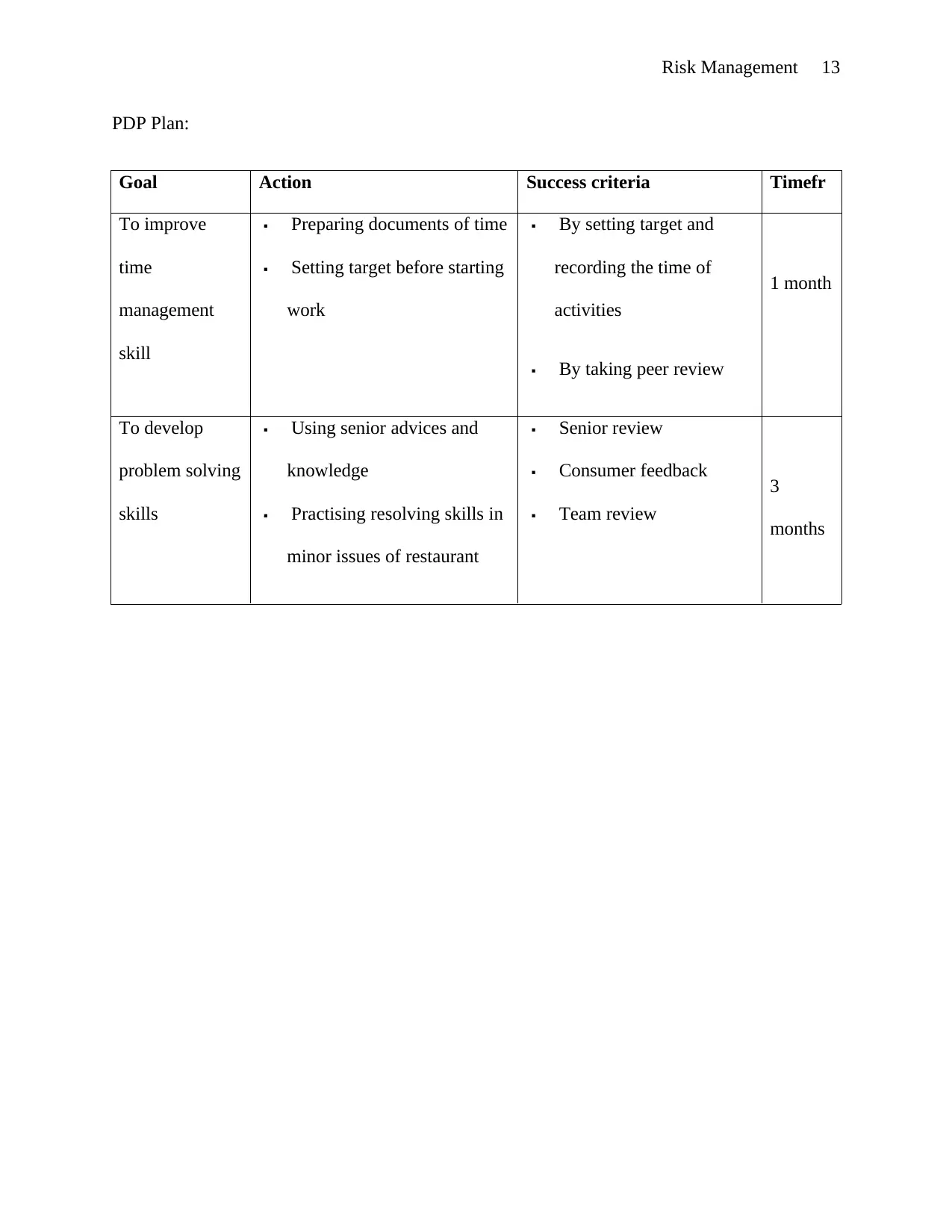
Risk Management 13
PDP Plan:
Goal Action Success criteria Timefr
ameTo improve
time
management
skill
Preparing documents of time
Setting target before starting
work
By setting target and
recording the time of
activities
By taking peer review
1 month
To develop
problem solving
skills
Using senior advices and
knowledge
Practising resolving skills in
minor issues of restaurant
Senior review
Consumer feedback
Team review
3
months
PDP Plan:
Goal Action Success criteria Timefr
ameTo improve
time
management
skill
Preparing documents of time
Setting target before starting
work
By setting target and
recording the time of
activities
By taking peer review
1 month
To develop
problem solving
skills
Using senior advices and
knowledge
Practising resolving skills in
minor issues of restaurant
Senior review
Consumer feedback
Team review
3
months
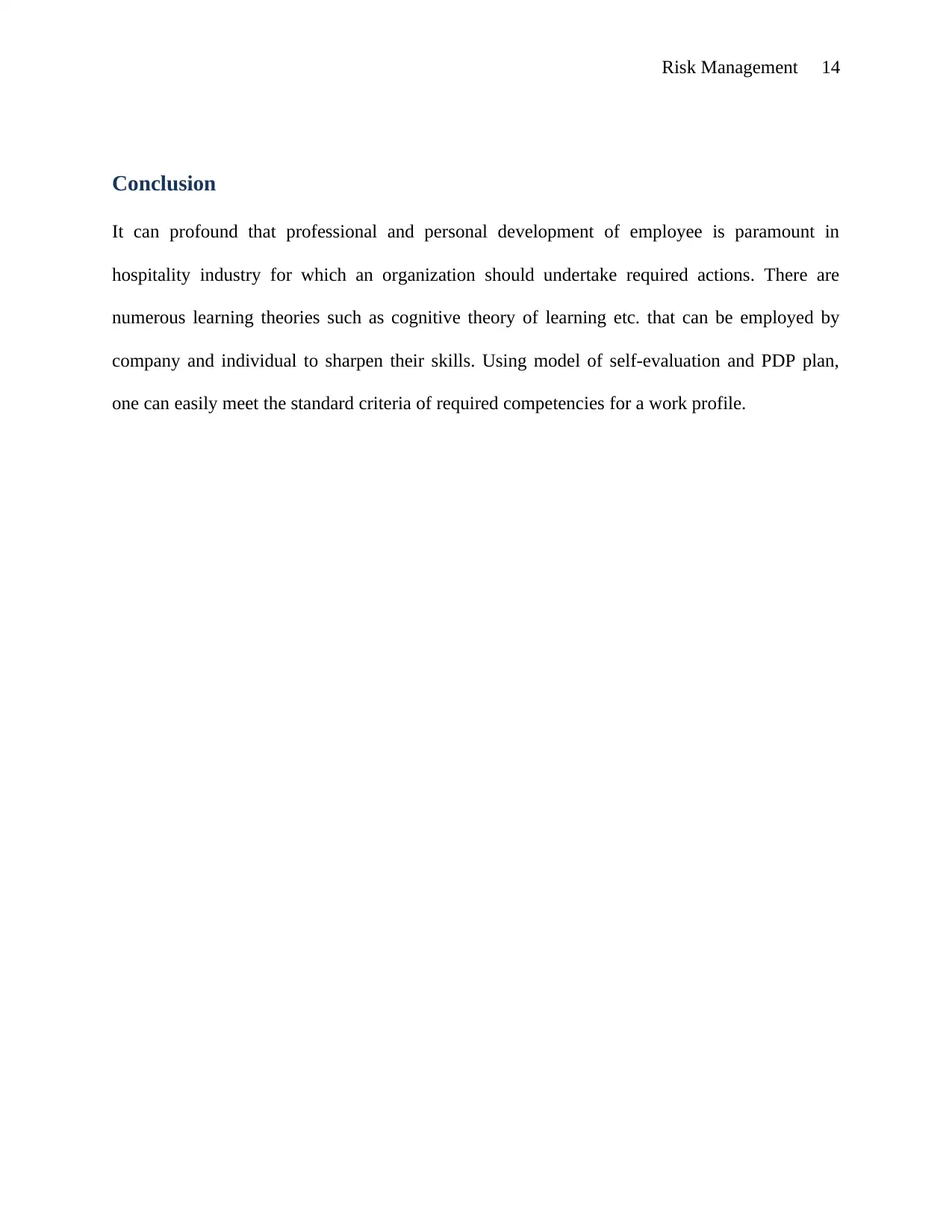
Risk Management 14
Conclusion
It can profound that professional and personal development of employee is paramount in
hospitality industry for which an organization should undertake required actions. There are
numerous learning theories such as cognitive theory of learning etc. that can be employed by
company and individual to sharpen their skills. Using model of self-evaluation and PDP plan,
one can easily meet the standard criteria of required competencies for a work profile.
Conclusion
It can profound that professional and personal development of employee is paramount in
hospitality industry for which an organization should undertake required actions. There are
numerous learning theories such as cognitive theory of learning etc. that can be employed by
company and individual to sharpen their skills. Using model of self-evaluation and PDP plan,
one can easily meet the standard criteria of required competencies for a work profile.
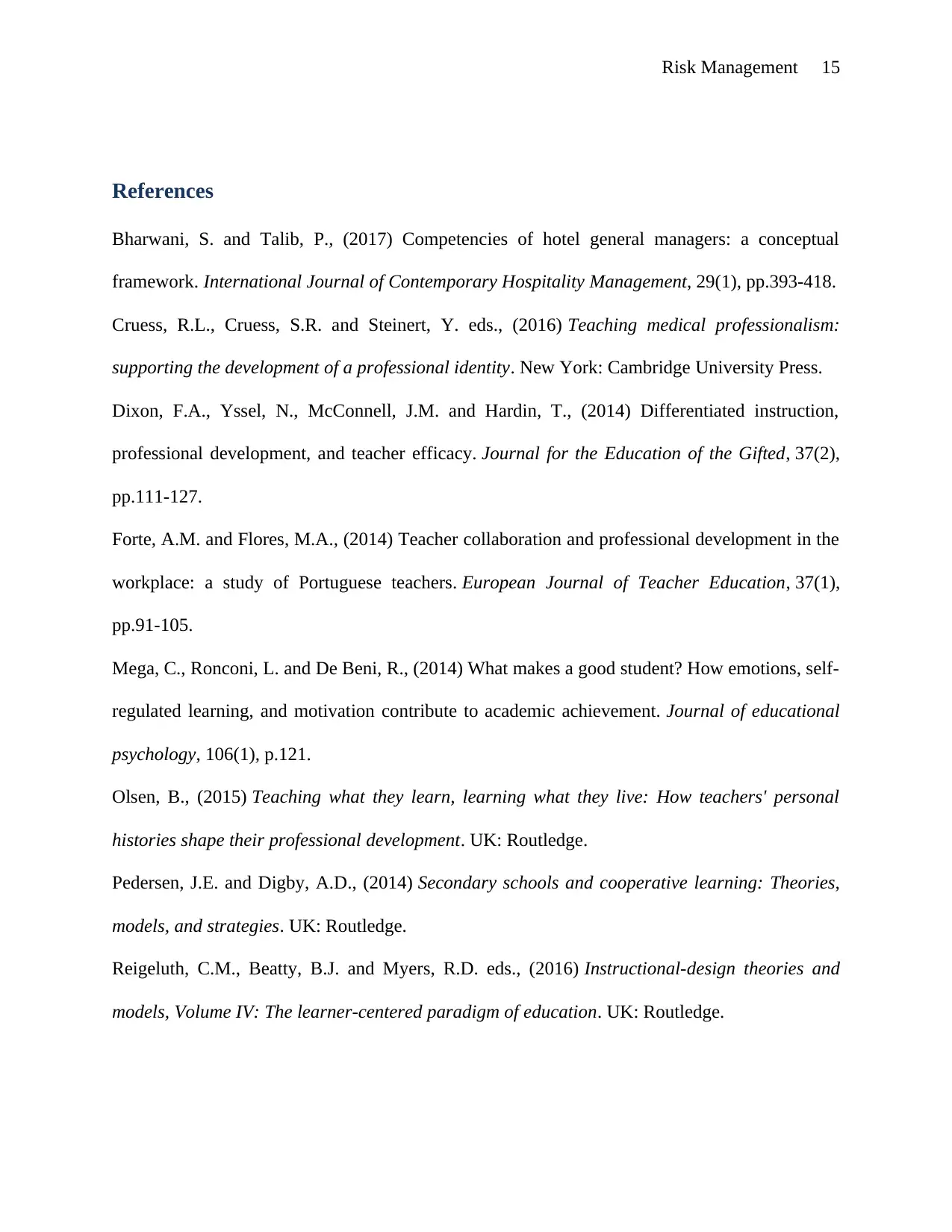
Risk Management 15
References
Bharwani, S. and Talib, P., (2017) Competencies of hotel general managers: a conceptual
framework. International Journal of Contemporary Hospitality Management, 29(1), pp.393-418.
Cruess, R.L., Cruess, S.R. and Steinert, Y. eds., (2016) Teaching medical professionalism:
supporting the development of a professional identity. New York: Cambridge University Press.
Dixon, F.A., Yssel, N., McConnell, J.M. and Hardin, T., (2014) Differentiated instruction,
professional development, and teacher efficacy. Journal for the Education of the Gifted, 37(2),
pp.111-127.
Forte, A.M. and Flores, M.A., (2014) Teacher collaboration and professional development in the
workplace: a study of Portuguese teachers. European Journal of Teacher Education, 37(1),
pp.91-105.
Mega, C., Ronconi, L. and De Beni, R., (2014) What makes a good student? How emotions, self-
regulated learning, and motivation contribute to academic achievement. Journal of educational
psychology, 106(1), p.121.
Olsen, B., (2015) Teaching what they learn, learning what they live: How teachers' personal
histories shape their professional development. UK: Routledge.
Pedersen, J.E. and Digby, A.D., (2014) Secondary schools and cooperative learning: Theories,
models, and strategies. UK: Routledge.
Reigeluth, C.M., Beatty, B.J. and Myers, R.D. eds., (2016) Instructional-design theories and
models, Volume IV: The learner-centered paradigm of education. UK: Routledge.
References
Bharwani, S. and Talib, P., (2017) Competencies of hotel general managers: a conceptual
framework. International Journal of Contemporary Hospitality Management, 29(1), pp.393-418.
Cruess, R.L., Cruess, S.R. and Steinert, Y. eds., (2016) Teaching medical professionalism:
supporting the development of a professional identity. New York: Cambridge University Press.
Dixon, F.A., Yssel, N., McConnell, J.M. and Hardin, T., (2014) Differentiated instruction,
professional development, and teacher efficacy. Journal for the Education of the Gifted, 37(2),
pp.111-127.
Forte, A.M. and Flores, M.A., (2014) Teacher collaboration and professional development in the
workplace: a study of Portuguese teachers. European Journal of Teacher Education, 37(1),
pp.91-105.
Mega, C., Ronconi, L. and De Beni, R., (2014) What makes a good student? How emotions, self-
regulated learning, and motivation contribute to academic achievement. Journal of educational
psychology, 106(1), p.121.
Olsen, B., (2015) Teaching what they learn, learning what they live: How teachers' personal
histories shape their professional development. UK: Routledge.
Pedersen, J.E. and Digby, A.D., (2014) Secondary schools and cooperative learning: Theories,
models, and strategies. UK: Routledge.
Reigeluth, C.M., Beatty, B.J. and Myers, R.D. eds., (2016) Instructional-design theories and
models, Volume IV: The learner-centered paradigm of education. UK: Routledge.
Secure Best Marks with AI Grader
Need help grading? Try our AI Grader for instant feedback on your assignments.
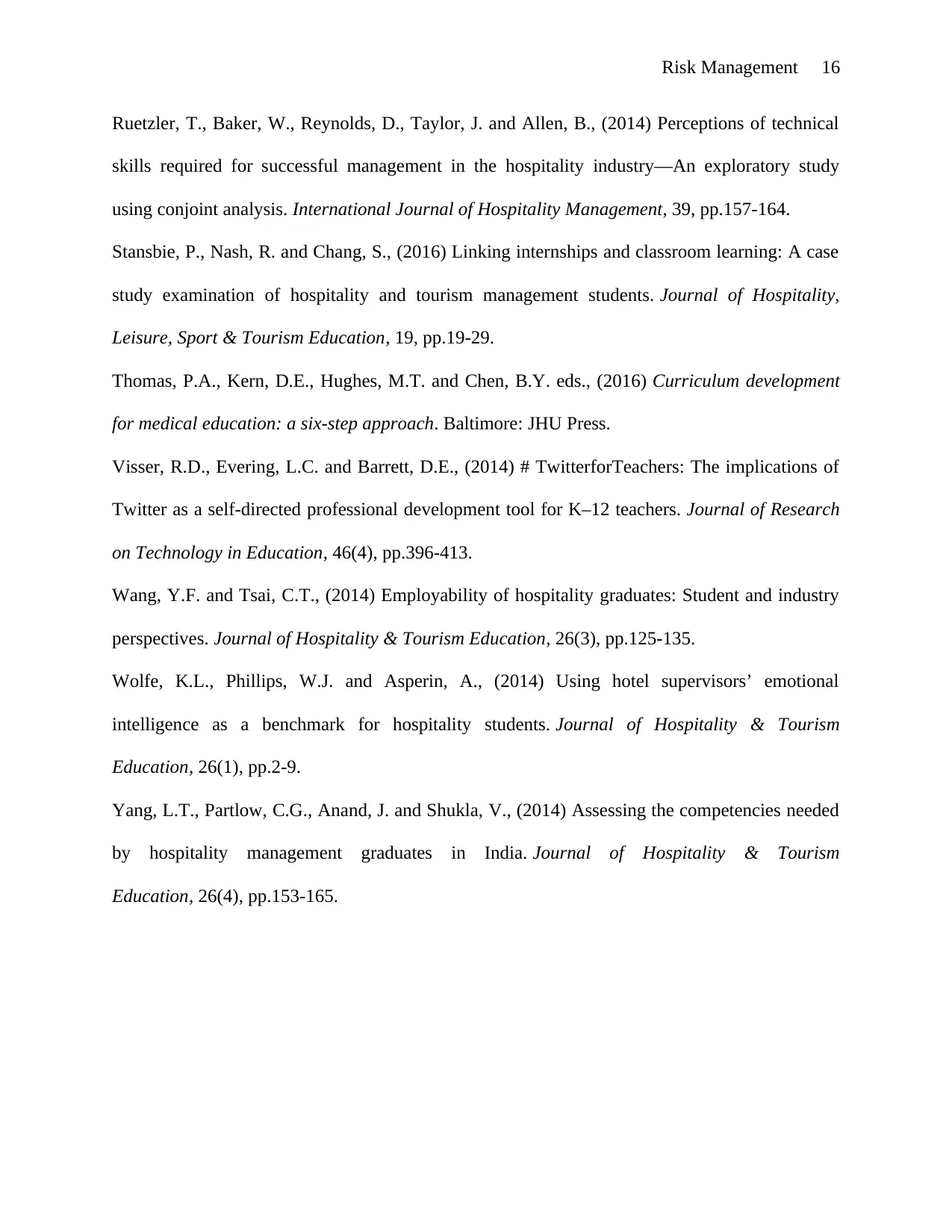
Risk Management 16
Ruetzler, T., Baker, W., Reynolds, D., Taylor, J. and Allen, B., (2014) Perceptions of technical
skills required for successful management in the hospitality industry—An exploratory study
using conjoint analysis. International Journal of Hospitality Management, 39, pp.157-164.
Stansbie, P., Nash, R. and Chang, S., (2016) Linking internships and classroom learning: A case
study examination of hospitality and tourism management students. Journal of Hospitality,
Leisure, Sport & Tourism Education, 19, pp.19-29.
Thomas, P.A., Kern, D.E., Hughes, M.T. and Chen, B.Y. eds., (2016) Curriculum development
for medical education: a six-step approach. Baltimore: JHU Press.
Visser, R.D., Evering, L.C. and Barrett, D.E., (2014) # TwitterforTeachers: The implications of
Twitter as a self-directed professional development tool for K–12 teachers. Journal of Research
on Technology in Education, 46(4), pp.396-413.
Wang, Y.F. and Tsai, C.T., (2014) Employability of hospitality graduates: Student and industry
perspectives. Journal of Hospitality & Tourism Education, 26(3), pp.125-135.
Wolfe, K.L., Phillips, W.J. and Asperin, A., (2014) Using hotel supervisors’ emotional
intelligence as a benchmark for hospitality students. Journal of Hospitality & Tourism
Education, 26(1), pp.2-9.
Yang, L.T., Partlow, C.G., Anand, J. and Shukla, V., (2014) Assessing the competencies needed
by hospitality management graduates in India. Journal of Hospitality & Tourism
Education, 26(4), pp.153-165.
Ruetzler, T., Baker, W., Reynolds, D., Taylor, J. and Allen, B., (2014) Perceptions of technical
skills required for successful management in the hospitality industry—An exploratory study
using conjoint analysis. International Journal of Hospitality Management, 39, pp.157-164.
Stansbie, P., Nash, R. and Chang, S., (2016) Linking internships and classroom learning: A case
study examination of hospitality and tourism management students. Journal of Hospitality,
Leisure, Sport & Tourism Education, 19, pp.19-29.
Thomas, P.A., Kern, D.E., Hughes, M.T. and Chen, B.Y. eds., (2016) Curriculum development
for medical education: a six-step approach. Baltimore: JHU Press.
Visser, R.D., Evering, L.C. and Barrett, D.E., (2014) # TwitterforTeachers: The implications of
Twitter as a self-directed professional development tool for K–12 teachers. Journal of Research
on Technology in Education, 46(4), pp.396-413.
Wang, Y.F. and Tsai, C.T., (2014) Employability of hospitality graduates: Student and industry
perspectives. Journal of Hospitality & Tourism Education, 26(3), pp.125-135.
Wolfe, K.L., Phillips, W.J. and Asperin, A., (2014) Using hotel supervisors’ emotional
intelligence as a benchmark for hospitality students. Journal of Hospitality & Tourism
Education, 26(1), pp.2-9.
Yang, L.T., Partlow, C.G., Anand, J. and Shukla, V., (2014) Assessing the competencies needed
by hospitality management graduates in India. Journal of Hospitality & Tourism
Education, 26(4), pp.153-165.
1 out of 17
Related Documents
Your All-in-One AI-Powered Toolkit for Academic Success.
+13062052269
info@desklib.com
Available 24*7 on WhatsApp / Email
![[object Object]](/_next/static/media/star-bottom.7253800d.svg)
Unlock your academic potential
© 2024 | Zucol Services PVT LTD | All rights reserved.





